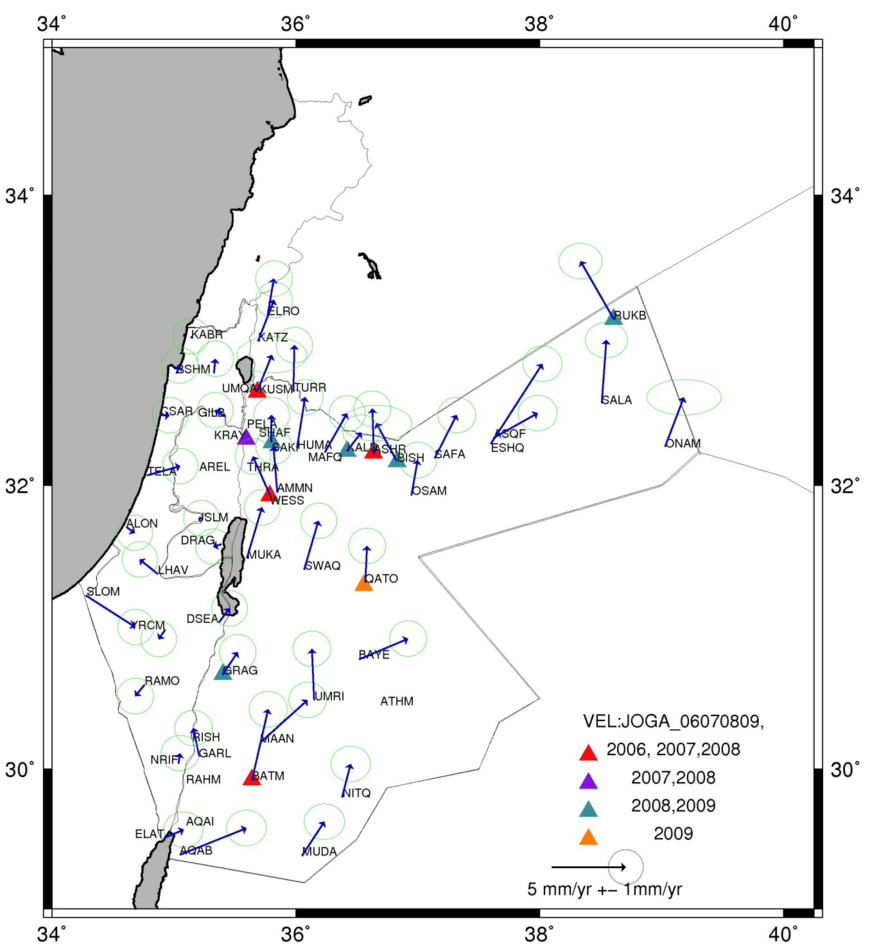The geodynamic GPS project JOGA (JOrdanian GPS Activities)
JOGA
[translate!] The Dead Sea region is a unique natural laboratory and provides an excellent opportunity to study fundamental geodynamic processes on a variety of scales. This will facilitate an understanding of how the interplay of structure and dynamics controls the occurrence and rate of earthquakes. It allows studying the geometry of upper crustal faulting, the mechanics of and asperities in the seismogenic zone, the formation, growth and subsidence of pull-apart basins, as well as how the surface deformation extends to the lower crust and even into the lower lithosphere. Given the scientific foundation provided by the research done until now, it is an ideal and most promising target for further advanced and sophisticated studies aimed at clarifying the relation between fundamental geodynamic processes on one hand and the resulting earthquakes and their relevance for the socio-economic development of this region on the other hand.
One of the key projects in the framework of GEO-DESIRE is the GPS project JOGA (JOrdanian GPS Activities). The primary aim of the GPS observation is the detection of the present day deformation field along the Dead Sea Fault System. So far, there are only few velocity estimates available which indicate Arabian versus Sinai plate motion near the Dead Sea Fault System (DSF). A common technique for investigating the kinematics of plate boundaries consists of a combination of GPS velocities and elastic dislocation models. These results indicate that the current slip rate is approximately 3.3 mm/yr. The GPS site in Amman, the only site on the territory of Jordan up to now, shows a southward motion which contradicts the left lateral motion between Sinai and the Arabian plate. All these studies suffer severely from a lack of data/stations in Jordan, the focus of our study. The only exception is the work of Dr. Klinger from the IPGP (Institute de Physique de Globe de Paris), who installed a network across the Araba fault segment south of the Dead Sea where the GPS sites are arranged in three profiles.
Of utmost importance for the GPS project was the thorough and careful reconnaissance and monumentation of 27 campaign-style GPS sites all over Jordan that are meanwhile extended to 46 sites including 4 continuously recording GPS stations in Amman, Ma’an, Ashquf, and in Al-Bayer, respectively. This task was performed by experts from NRA and GFZ in May 2005. The markers for three permanent GPS stations are installed on the roof of the cartography building of NRA in Amman, at the new building of NRA center in Ma’an, and on the new roof of the civil defense in Ashquf. The permanent site in Al-Bayer is a joint installation of German (GFZ), French (IPG) and Jordanian (NRA) partners.
The successful fourth re-observation of the JOGA network was performed in November/December 2010. Throughout the campaign, 7 observation teams observed simultaneously during 5 sessions whereby each session lasted 3 days. At least 65 hours of high quality GPS data were collected at all sites. The data of the first three re-observations have been processed already and show good accuracies. The preliminary result is shown in the figure below.
In addition to the campaign observation we updated the four permanent GPS sites in Amman, Ma’an, Ashquf, and in Al-Bayer. All sites are now equipped with a special PC and the sites in Amman and Ma’an are connected to the Internet. Although permanent installations are more expensive than episodic campaign surveys, they provide site motions at the highest precision and are especially suited to observe transient deformation. In addition, it is indispensable to connect the campaign-mode observations with data from a number of continuously recording sites that should be either inside the investigated area and/or as close as possible to the campaign sites. Continuously observing GPS-stations are crucial for the detection of transient as well as secular trends in surface displacements.
We will continue and extend our GPS activities in Israel, Jordan and the Palestine Territories in the framework of the Dead Sea Research Venue DESERVE.

